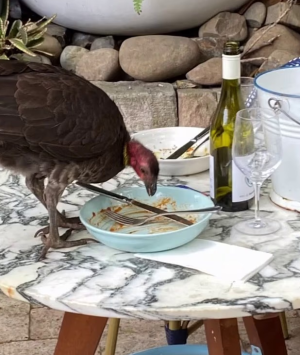Animal attacks spark chaos in elite suburb, cafe diners urged to stay alert
By
Gian T
- Replies 0
If you assumed your morning brew by the coast came with little more than the usual winged nuisances, think again.
One coastal suburb has found itself dealing with an unexpected visitor that's ruffling more than just feathers.
The surprise intruder has quickly become a curious—and slightly chaotic—part of daily life.
Yes, you read that right. Once a shy bush-dweller, the humble Australian brush turkey has become the unlikely villain of the café scene, launching what locals call 'terrifying ambushes' on unsuspecting diners.
Forget bin chickens—there’s a new bird in town, and it’s not afraid to ruffle a few feathers.
For years, the brush turkeys were just part of the scenery at Shelly Beach’s popular cafes.
They’d strut around, maybe scavenge a crumb or two, but nothing out of the ordinary.
However, according to Ben Collis, head of commercial and marketing at The Boathouse Group, the past year has seen a dramatic change.
'The brush turkeys have always been something our operational team has had to manage at Shelly Beach since opening in 2015,' he told the media.
'But in the last six to twelve months, it’s become much worse as numbers have increased and their behaviour is significantly impacting guests’ experiences.'
It’s not just a matter of a few birds wandering through the outdoor seating. These turkeys have become bold, jumping on tables, smashing glassware, and even pecking at patrons in their relentless quest for food.
Some diners have reported being 'set upon' while enjoying their morning coffee, with the birds showing no fear as they hunt for scraps.
Brush turkeys are native to Australia and, believe it or not, are a protected species.
That means you can’t harm them, move them, or even disturb their eggs without risking a hefty fine (up to $22,000 or six months in jail!). But why the sudden surge in numbers and aggression?
According to Dr Ann Goth, a leading expert who’s spent decades studying these birds, the answer is simple: they’re smart, adaptable, and have learned that where there are humans, there’s food.
'As soon as they receive food in a cafe—either by being fed, picking up crumbs, or stealing from plates—they become bolder,' she explained.
'Just like kookaburras and seagulls, they quickly learn where the easy pickings are.'
It’s not just the cafes, either. Brush turkeys love gardens with moist mulch (perfect for digging and building their famous mounds), pet food left outside, bird feeders, and open compost heaps. In short, our suburban lifestyles are a brush turkey’s dream come true.
While the stories of 'attacks' sound dramatic, Dr Goth quickly clarifies that brush turkeys can’t actually bite (they have no teeth), but they can give a sharp peck with their beak.
The National Parks and Wildlife Service agrees, noting that while the birds 'typically do not pose danger to people,' large congregations or bold behaviour can be a nuisance.
Still, for café owners and diners, the experience of having your breakfast interrupted by a marauding turkey is less than ideal.
The Boathouse Group has escalated the issue to the Northern Beaches Council and National Parks and Wildlife, seeking advice on managing the situation without harming the birds.
Since brush turkeys are protected, the solution isn’t as simple as shooing them away.
The National Parks and Wildlife Service recommends deterrent measures and modifying the environment to make it less appealing for nesting or foraging.
This could mean covering compost heaps, removing food sources, and educating the public not to feed the birds, deliberately or accidentally.
Dr Goth also suggests that education is key. In Brisbane, where brush turkeys have been a fixture for much longer, cafes have learned to avoid feeding them and to inform patrons about the risks.
'Cafe owners need to learn to avoid feeding brush turkeys in any way,' she says. 'This includes educating their patrons.'
It’s worth noting that brush turkeys were once hunted to near extinction during the Great Depression.
Their recent resurgence is actually a sign of a healthy ecosystem and a testament to their resilience.
As Dr Goth puts it, 'They are now returning to areas where they used to occur, and in numbers that were normal before the 1950s.'

Have you ever been ambushed by a brush turkey while enjoying a meal out? Do you have any tips for keeping these clever birds at bay? Share your stories and advice in the comments below.
Read more: ‘This is actually breaking my heart’: Rescuers share heart-wrenching details of a wildlife tragedy
One coastal suburb has found itself dealing with an unexpected visitor that's ruffling more than just feathers.
The surprise intruder has quickly become a curious—and slightly chaotic—part of daily life.
Yes, you read that right. Once a shy bush-dweller, the humble Australian brush turkey has become the unlikely villain of the café scene, launching what locals call 'terrifying ambushes' on unsuspecting diners.
Forget bin chickens—there’s a new bird in town, and it’s not afraid to ruffle a few feathers.
For years, the brush turkeys were just part of the scenery at Shelly Beach’s popular cafes.
They’d strut around, maybe scavenge a crumb or two, but nothing out of the ordinary.
However, according to Ben Collis, head of commercial and marketing at The Boathouse Group, the past year has seen a dramatic change.
'The brush turkeys have always been something our operational team has had to manage at Shelly Beach since opening in 2015,' he told the media.
'But in the last six to twelve months, it’s become much worse as numbers have increased and their behaviour is significantly impacting guests’ experiences.'
It’s not just a matter of a few birds wandering through the outdoor seating. These turkeys have become bold, jumping on tables, smashing glassware, and even pecking at patrons in their relentless quest for food.
Some diners have reported being 'set upon' while enjoying their morning coffee, with the birds showing no fear as they hunt for scraps.
Brush turkeys are native to Australia and, believe it or not, are a protected species.
That means you can’t harm them, move them, or even disturb their eggs without risking a hefty fine (up to $22,000 or six months in jail!). But why the sudden surge in numbers and aggression?
According to Dr Ann Goth, a leading expert who’s spent decades studying these birds, the answer is simple: they’re smart, adaptable, and have learned that where there are humans, there’s food.
'As soon as they receive food in a cafe—either by being fed, picking up crumbs, or stealing from plates—they become bolder,' she explained.
'Just like kookaburras and seagulls, they quickly learn where the easy pickings are.'
While the stories of 'attacks' sound dramatic, Dr Goth quickly clarifies that brush turkeys can’t actually bite (they have no teeth), but they can give a sharp peck with their beak.
The National Parks and Wildlife Service agrees, noting that while the birds 'typically do not pose danger to people,' large congregations or bold behaviour can be a nuisance.
Still, for café owners and diners, the experience of having your breakfast interrupted by a marauding turkey is less than ideal.
The Boathouse Group has escalated the issue to the Northern Beaches Council and National Parks and Wildlife, seeking advice on managing the situation without harming the birds.
Since brush turkeys are protected, the solution isn’t as simple as shooing them away.
This could mean covering compost heaps, removing food sources, and educating the public not to feed the birds, deliberately or accidentally.
Dr Goth also suggests that education is key. In Brisbane, where brush turkeys have been a fixture for much longer, cafes have learned to avoid feeding them and to inform patrons about the risks.
'Cafe owners need to learn to avoid feeding brush turkeys in any way,' she says. 'This includes educating their patrons.'
It’s worth noting that brush turkeys were once hunted to near extinction during the Great Depression.
As Dr Goth puts it, 'They are now returning to areas where they used to occur, and in numbers that were normal before the 1950s.'
Key Takeaways
- Aggressive brush turkeys have become a major issue for cafes and diners on Sydney’s northern beaches, with reports of birds pecking patrons, jumping on tables, and smashing glassware.
- The growing population of brush turkeys is causing significant disruption to local businesses, prompting cafe owners to escalate the problem to the council and National Parks and Wildlife authorities.
- As a protected native species, it is illegal to harm or capture brush turkeys or their eggs; instead, businesses and residents are advised to use deterrents and environmental modifications to discourage the birds.
- Experts say the turkeys’ boldness results from easy access to human food, urging cafe owners and patrons not to feed the birds and to adopt better practices learned in other cities like Brisbane.
Read more: ‘This is actually breaking my heart’: Rescuers share heart-wrenching details of a wildlife tragedy








